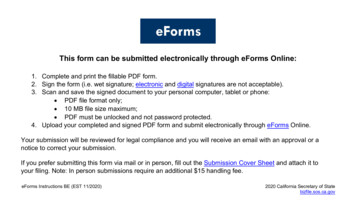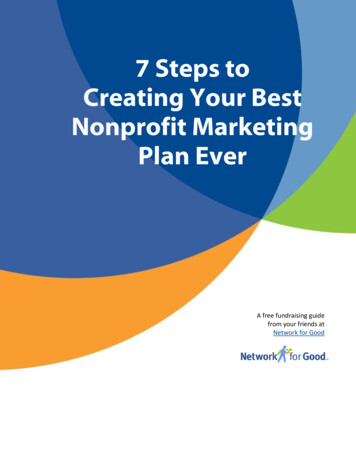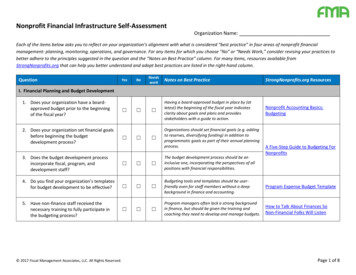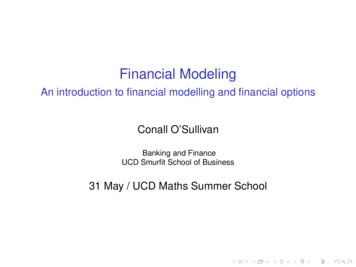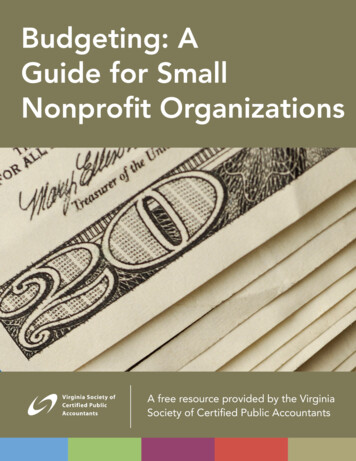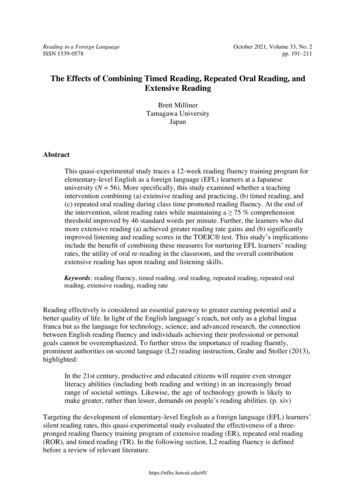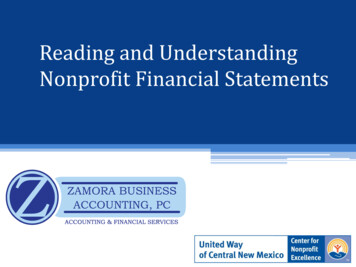
Transcription
Reading and UnderstandingNonprofit Financial Statements
What does it mean to bea nonprofit?
A nonprofit is an organization that uses surplusrevenues to achieve its goals rather thandistributing them as profit or dividends. The mission of the organization is the main goal,however profits are key to the growth andlongevity of the organization.
Your Role in Financial Oversight Ensure that resources are used to accomplish themission Ensure financial health and that contributionsare used in accordance with donor intent Review financial statements Compare financial statements to budget Engage independent auditors
Cash Basis vs. Accrual Basis Cash Basis Revenues and expenses are not recognized untilmoney is exchanged. Accrual Basis Revenues and expenses are recognized when anobligation is made.
Unaudited vs. Audited Unaudited Usually Cash Basis Prepared internally or through abookkeeper/accountant Prepared more frequently (Quarterly or Monthly) Audited Accrual BasisPrepared by a CPAPrepared yearlyHave an Auditor’s Opinion
Financial Statements Statement of Activities Income Statement Profit (Loss) Measures the revenues against the expenses Revenues – Expenses Change in Net Assets Profit (Loss) Statement of Financial Position Balance Sheet Measures the assets against the liabilities and net assets Assets Liabilities Net Assets Statement of Cash Flows Measures the changes in cash
Statement of Activities(Unaudited Cash Basis) Revenues Service revenuesContributionsGrantsFundraising Expenses ProgramManagementFundraising
Things to Consider Trends for both revenues and expenses Restrictions placed on revenues bydonor/grantor Relationship between fundraising revenues andfundraising expenses Key revenue sources Largest expense categories
Budgeted Statement of Activities(Unaudited Cash Basis) The executive director usually prepares thebudget and the board of directors approves it Use historical information to plan for future Underestimate revenues and overestimateexpenses
Things to Consider Causes for revenue shortfalls and/or expenseoverages Are revenue shortfalls correlated to expensesavings and vice versa Was budget realistic Look for unbudgeted items
Audited Statement of Activities Accrual Basis Includes Statement of Functional Expenses Program Management Fundraising Auditor uses expertise to make assumptions
Things to Consider Look for differences from Cash Basis to Accrual Auditor’s Opinion Unqualified Qualified Adverse Method(s) used to allocate expenses betweenprogram, management, and fundraising Review auditor’s report
Statement of Financial Position(Cash Basis Unaudited) Assets Cash Equipment (Accumulated depreciation) Liabilities Payroll taxes Loans Equity Fund balance Year-to-date earnings
Things to Consider Current Ratio Current Assets/Current Liabilities The higher the ratio the better the capability to payback debts Trends in Cash and Liabilities Is the organization able to function without the useof debt? The Age/State of Equipment Are there major replacements that are going to beneeded?
Audited Statement of FinancialPosition Accrual Basis Includes breakdown of net assets Unrestricted Temporarily restricted (specific use only) Permanently restricted (principal can never beused)
Things to Consider Differences between Cash Basis and Accrual Assets and/or liabilities not listed or changed fromCash Basis
Statement of Cash Flows Cash flows separated by activities Operating activities Investing activities Financing activities Shows “where the money went” Usually prepared by auditor
Review Sample Financial Statements inGroups Group 1 – Review Income Statement Group 2 – Review Budgeted Income Statement Group 3 – Review Audited Statements of Activities andFunctional Expenses and compare to Cash Basis IncomeStatement Group 4 – Review Statement of Financial Position andcompare to Cash Basis Balance Sheet Group 5 – Review Statement of Cash Flows and Compare toAudited Statements of Activities, Functional Expenses andFinancial Position
Isaac J. Zamora, EAisaac@zamorabusinessaccounting.com505-837-2900
Review Sample Financial Statements in Groups Group 1 – Review Income Statement Group 2 – Review Budgeted Income Statement Group 3 – Review Audited Statements of Activities and Functional Expenses and compare to Cash Basis Income Statement Group 4 – Re
